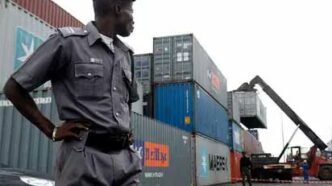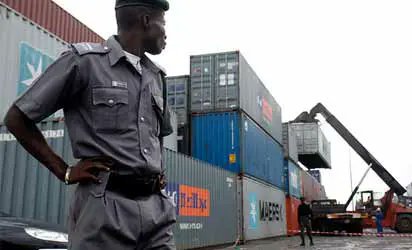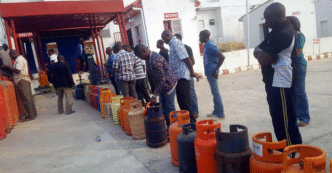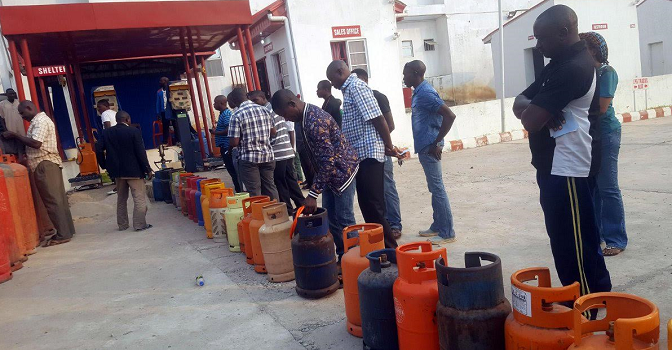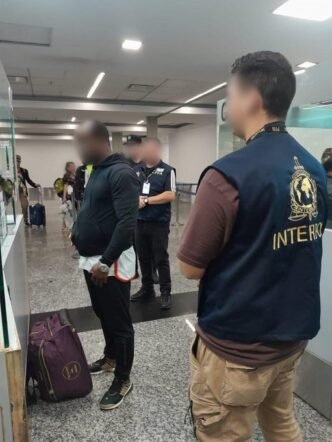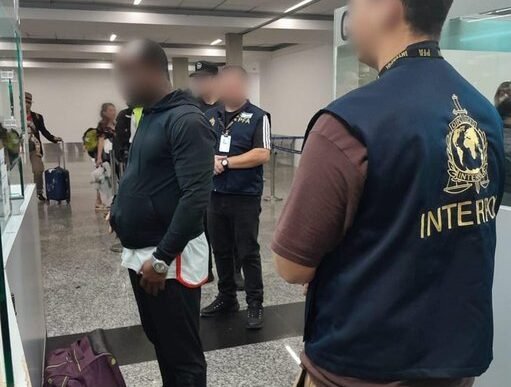The Federal Operations Unit (FOU) Zone A of the Nigeria Customs Service (NCS) has announced the interception of contraband goods valued at over ₦1.2 billion within the last six weeks, as part of its intensified crackdown on smuggling and economic sabotage.
The seizures, made between August and September 2025, reflect the Service’s sustained commitment to enforcing government trade policies, securing Nigeria’s borders, and safeguarding the nation’s economy from illicit imports.
A Record Haul in Six Weeks
The Acting Customs Area Controller of FOU Zone A, Deputy Comptroller Hussein Ejibunu, disclosed the development during a press briefing at the Unit’s headquarters in Ikeja, Lagos.
According to Ejibunu, the seized goods included a wide range of prohibited items—ranging from foreign parboiled rice and premium motor spirit (petrol) to used vehicles, textiles, pharmaceuticals, and fake currency notes.
He revealed that the total Duty Paid Value (DPV) of the intercepted items amounted to ₦1.2 billion, adding that several suspects were arrested in connection with the seizures and are currently undergoing investigation.
“These seizures underscore our relentless drive to suppress smuggling and protect the local economy. The smugglers keep innovating, but our officers have remained vigilant and adaptive,” Ejibunu said.
Breakdown of the Seizures
Giving a detailed account, the Customs boss listed the items confiscated within the review period as follows:
- 5,345 bags of 50kg foreign parboiled rice — equivalent to over nine trailer loads, intercepted at various border routes and warehouses.
- 2,210 kegs of 25 litres each of Premium Motor Spirit (PMS), commonly known as petrol, seized from smugglers attempting to divert the product across land borders.
- 138 used vehicles (Tokunbo) smuggled into the country through unapproved routes.
- 1,760 bales of second-hand clothing and textiles, violating import restrictions under Nigeria’s trade laws.
- 345 cartons of unregistered pharmaceuticals and medicaments, mostly imported without NAFDAC approval.
- Several sacks of used shoes, tyres, and electrical appliances, suspected to be substandard.
- Fake foreign currency amounting to $11,600, seized from suspects along the Seme axis.
Ejibunu noted that the seized vehicles and goods were concealed cleverly within legitimate cargo and commercial trucks, but customs officers uncovered them through “credible intelligence and aggressive field operations.”
Strategic Operations and Intelligence-Driven Enforcement
The Customs Controller attributed the success to a combination of strategic intelligence gathering, inter-agency collaboration, and community engagement.
He explained that FOU Zone A has been using a hybrid approach that combines traditional patrols with modern data analytics, drone surveillance, and cross-border intelligence sharing.
“Our operatives have been trained to interpret intelligence reports and act swiftly. We also collaborate with sister security agencies, including the Nigerian Army, Police, and NDLEA, to track and intercept these goods,” he said.
Ejibunu further emphasized that anti-smuggling operations were carried out in high-risk corridors such as Idiroko, Seme, Ilaro, Abeokuta, and Oyo–Osun axis, with enhanced checkpoints and random cargo profiling at inland depots and warehouses.
Impact on National Economy
The Customs Service has consistently maintained that smuggling undermines Nigeria’s industrial growth, food security, and fiscal stability.
By intercepting these goods, the Service says it has saved the country billions in potential revenue losses and protected local industries from unfair competition.
“The importation of foreign rice and used textiles directly affects our local farmers and manufacturers. Every seizure we make is an act of economic patriotism,” Ejibunu stressed.
According to him, unchecked smuggling of petroleum products also worsens fuel scarcity and deprives the nation of vital resources. “We must understand that smuggling is not just an economic crime; it is a threat to national security,” he added.
Arrests and Prosecutions
The Customs boss confirmed that nine suspects were arrested in connection with various seizures during the period under review.
The suspects, according to him, are currently being interrogated and will face prosecution once investigations are concluded.
“Our enforcement is guided by due process. While we are firm, we also ensure that suspects’ rights are protected and that cases are handled within the ambit of the law,” he said.
Revenue Recovery and Anti-Fraud Operations
Aside from the seizures, FOU Zone A also recorded ₦65.2 million in revenue recovery from demand notices raised on goods that were under-declared or improperly cleared at ports and border stations.
These recoveries, Ejibunu explained, came from diligent revaluation, auditing, and reconciliation exercises conducted by the Unit’s Post-Clearance Audit teams.
“This is money that would have been lost to underpayment and manipulation of customs documents. We are plugging every loophole,” he said.
Challenges in the Field
Despite the achievements, Ejibunu acknowledged that anti-smuggling operations remain challenging. Officers frequently face hostile attacks, ambushes, and bribe temptations from syndicates determined to circumvent the law.
He commended the professionalism and resilience of his officers, many of whom operate in difficult terrains and under intense pressure.
He also called for community support, urging border residents to resist aiding smugglers and to provide information that could help security agencies combat illegal trade.
“Smuggling thrives when communities turn a blind eye. We need citizens to see this as a collective fight for our nation’s prosperity,” he appealed.
Public Awareness and Compliance Drive
In line with the Service’s modernization agenda, Ejibunu noted that the Unit has stepped up public sensitization campaigns to educate traders and transporters on the dangers of smuggling and the benefits of legal trade.
He said many traders are now voluntarily approaching Customs offices to clarify import guidelines and obtain proper documentation before moving goods.
“We are not enemies of trade. Our role is to ensure that legitimate commerce thrives while illegal activities are curtailed,” Ejibunu explained.
Reinforcing Tinubu Administration’s Fiscal Reforms
The seizure aligns with the broader objectives of the Tinubu administration’s economic and fiscal reforms, which prioritize transparency, revenue mobilization, and industrial protection.
The Customs Service, under the leadership of Comptroller-General Bashir Adewale Adeniyi, has intensified nationwide enforcement to support these reforms.
Since his appointment, Adeniyi has introduced several modernization measures, including the E-Customs project, border management technology, and enhanced officer welfare, all aimed at improving operational efficiency.
Ejibunu reiterated that FOU Zone A remains committed to implementing the Comptroller-General’s vision of a “smart, efficient, and transparent Customs Service.”
A Warning to Smugglers
Sending a stern message to smugglers, Ejibunu vowed that the Nigeria Customs Service will sustain its aggressive anti-smuggling campaign across all routes and borders.
“Those who think they can beat the system should think again. We are several steps ahead, and we will not relent,” he warned.
He added that the Service will continue to prosecute offenders and dispose of seized items in accordance with legal and environmental standards.
Public Commendation and Next Steps
The FOU Zone A Controller thanked the media and law-abiding citizens for their continued support, noting that the fight against smuggling is not a Customs responsibility alone but a national duty.
He urged importers and freight forwarders to comply with trade regulations and embrace the Service’s Trade Facilitation Initiatives, which reward transparency and compliance.
As Nigeria strengthens its border controls amid global economic volatility, the Customs Service’s renewed enforcement strategy is expected to further tighten the noose around smugglers and illegal traders.
For Ejibunu and his team, the message remains clear: the days of easy smuggling are over.

